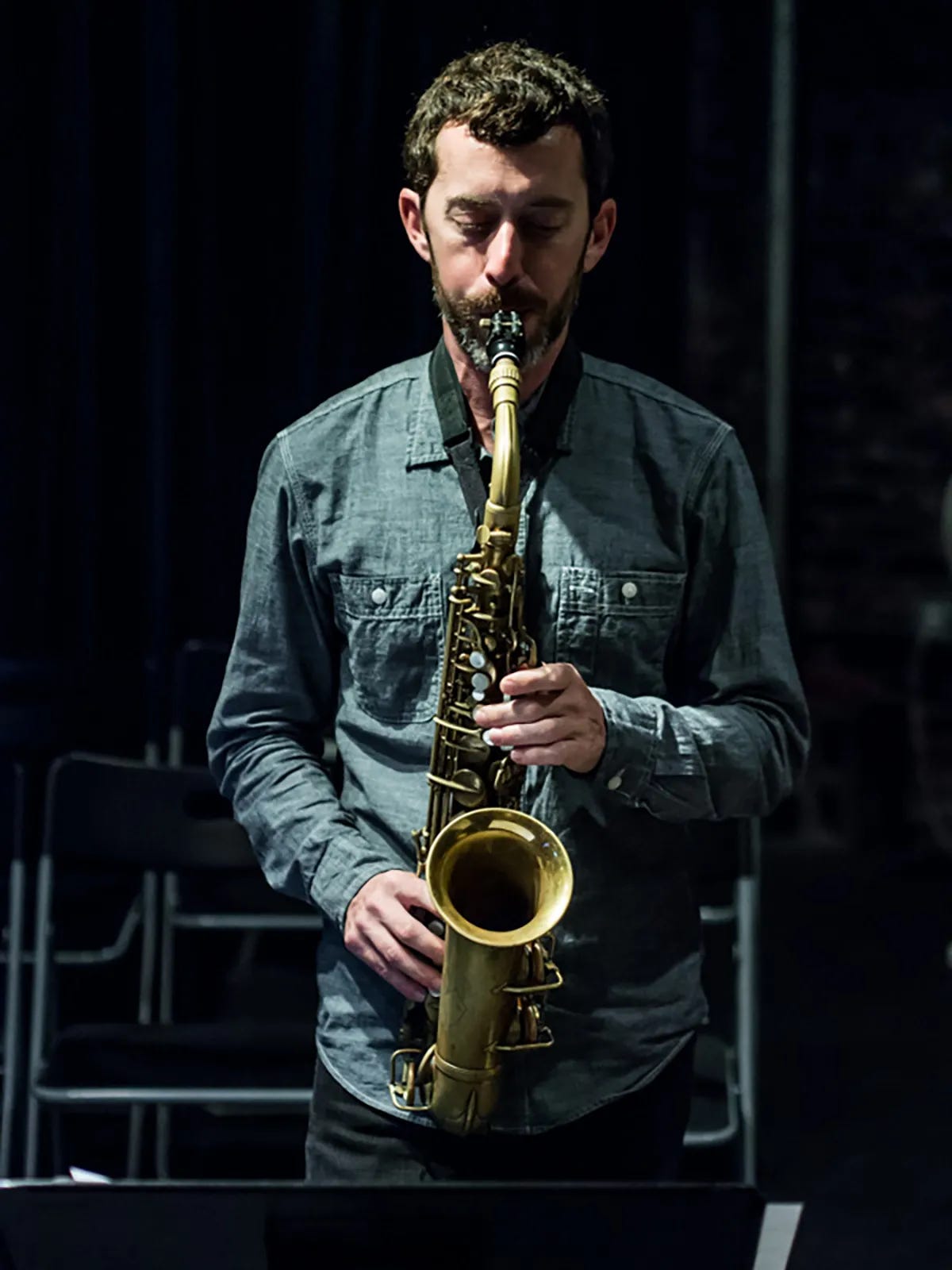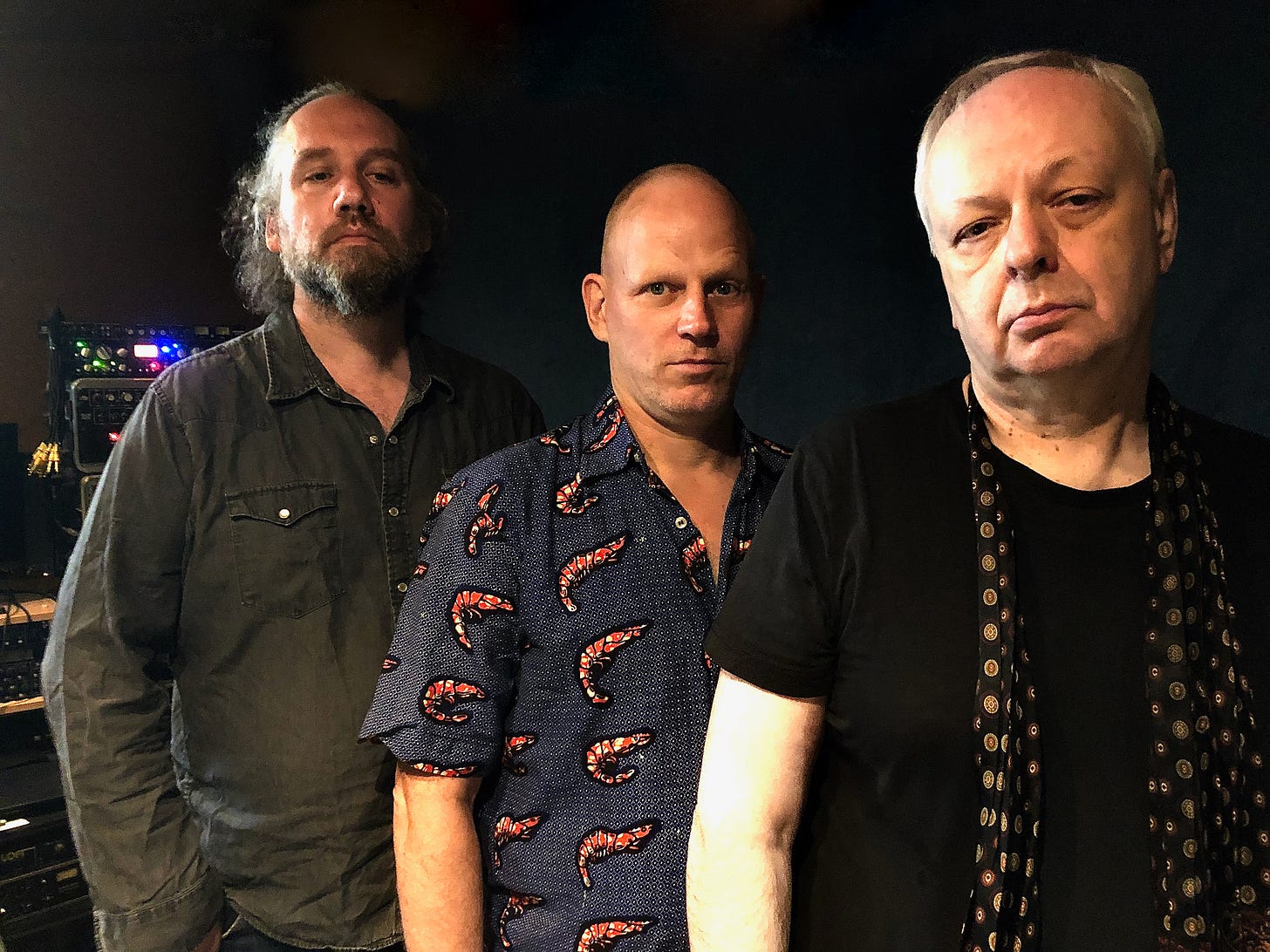Since the last edition of this newsletter I’ve learned definitively that it might not have been the brightest idea to launch such an endeavor right before taking a two-week trip to the US, which included an unrelenting array of quotidian tasks involved with running a music festival with what’s essentially a staff of one (me)—no shine on the excellent staff of Constellation, which ran every show at the venue like clockwork, as well as the Renaissance Society and Corbett vs. Dempsey, which both hosted performances, too. The point has been taken. From here on out, a new edition of this newsletter will go out each Monday. Except that this one is going out on Friday, so there won’t be another this coming Monday, March 6.
Speaking of that trip, the festival was fantastic, all biases aside. While in Chicago I also got to duck in to a super impressive trio set led by alto saxophonist Aram Shelton (back in Chicago for the time being after extended stays in Budapest and Copenhagen), performing with old pal Tim Daisy on drums and newer pal Andrew Scott Young on double bass—the latter really impressed me, revealing new facets to a rich diapason already flush through recent work with Ryley Walker, the flat-out skronk of Tiger Hatchery, and countless sessions in disparate projects of various undergrounds. The tunes were measured in their gloom, but they danced masterfully with the reedist’s innate buoyancy. During his Chicago days Shelton often balanced a post-bop practice and a serious investment in electronic procedures, but I’ve never heard him blend them with such elegance, assurance, and effectiveness. Note to self, but also everyone else: pay attention to Aram Shelton!
Georg Gräwe isn’t looking back
Last year Corbett vs. Dempsey reissued two excellent albums by German pianist Georg Gräwe from the mid-1970s that were originally released by FMP. It was rather embarrassing to have never heard them, let alone be unaware of their existence. They’re both fantastic, especially Pink Pong, a kind of free jazz-hard bop collision. Earlier this year Gräwe turned up in a new collective trio called Dry Thrust that not only reaffirms his brilliance as an improviser, but reinforces his curiosity and forward-looking mindset. The group features two Austrians of a younger generation—guitarist Martin Siewert (Radian, Trapist) and drummer Didi Kern—who together forge a sonic foundation that’s novel for the keyboardist. The Less You Sleep (Trost) is a wonderfully jagged, noisy, and varied set of improvisations, with Gräwe on organ rather than piano. It's as edgy and confrontational as anything he’s ever done.
From track to track the album jumps around without surrendering a tightly-coiled intensity. Siewert tends to set the tone, toggling between approaches that include post-Arto Lindsay clatter, finely controlled swells of feedback, clear-toned resonance, and needling runs, with his partners both complementing and clashing with his choices. At times Kern lays down a carpet of low-end rumble punctuated by cymbal clang, and elsewhere he summons knotted-up chaos. Gräwe switches between almost pointillistic stabs, fraught long tones, and manic, skittering explosions. The whole session is a tightrope walk of tension-and-release, where the former rules the day, and the music is built around heightened real-time interaction and spontaneity, channeling the sonic vocabulary of vintage no wave in a free improv context.
The Return of Johnny Chang
The great violinist/violist Johnny Chang left Berlin during the pandemic, resettling in New Zealand where he earned his bachelor’s degree in music nearly two decades ago. Although he wasn’t a high-profile presence, during my first year or so in Berlin some of my most memorable concert-going experiences featured his playing. I first heard him with Catherine Lambat the Edition Festival of Other Music in Stockholm in 2019 as part of the Viola Torros duo , which remains a favorite, and he was also a key presence in the the James Tenney celebration mounted by Harmonic Space Orchestra during a precious lull in the lockdown back in October of 2020. Now he’s back in town for a spell, and on Wednesday March 8 he’ll be at KM28, playing music from his latest duo project with fellow violinist Kier GoGwilt, a Scottish musician based mainly in New York.
The duo began to work together in New Zealand in February of 2021, forging a new hybrid of durational playing and medieval and renaissance music (with material inspired by Orlando di Lasso, Hildegard von Bingen, and plainsong from the Cantigas de Santa Maria). It’s a stunning endeavor that vividly underlines the gorgeous harmonies and slow-moving melodies found in 16th century music while tapping into the mind expanding possibilities of just intonation. The music on the fantastic Hope Lies Fallow (Another Timbre) feels both ancient and futuristic, conjuring spaces for deep contemplation and atmospheric mind trips. The composer Celeste Oram adds wordless vocals to a few pieces, threading the dense duets with a weightless, genuinely ethereal presence, but the rapport and interaction of the two violinists is so powerful and telepathic that little else is needed. I can’t wait to be in the same space where these vibrational sounds are produced.
Nowhere Street Presents
The next Nowhere Street concert happens on Sunday, March 5 at KM28, with Gard Nilssen’s Acoustic Unity. This agile trio with bassist Petter Eldh and reedist André Roligheten has been one of my favorite working bands over the last few years, and after the pandemic serious curbed its momentum, the ensemble reemerged with greater focus and energy than ever. Last year it dropped a terrific album for ECM called Elastic Wave, and the subsequent performances I caught last summer upped the ante significantly. The trio honors lots of post-bop verities, touching on the legacy of the Blue Notes and Chris McGregor’s Brotherhood of Breath, meditative Scandinavian folk melodies, and sleek, hard-swinging grooves. All three members contribute elegant themes, and the restraint of the recording bursts open on stage, maintaining composure and form as the intensity swells. The trio forms the core of the drummer’s Supersonic Orchestra, which delivered a fantastic set at November’s Jazzfest Berlin. Shockingly, this is the trio’s first Berlin show in several years—don’t miss it.
Recommended concerts this week:
March 4: Banquet of Consequences—Pierre Borel (alto sax), Toby Delius (tenor sax, clarinet), Anil Eraslan (cello), Rieko Okuda (piano), Antonio Borghini (double bass), and Steve Heather (drums)—8 PM, KM28, Karl-Marx-Straße 28 12043 Berlin
March 4: Sophie Agnel (piano), Joke Lanz (turntables), and Michael Vatcher (drums)/Taste Tribes—Alfred 23 Harth (reeds), Hans Joachim Imler (keyboards), Günter Müller (iPods, electronics), Wolfgang Seidl (drums, synthesizers)—8:30 PM, Ausland, Lychener Straße 60, 10437 Berlin
March 5: Arditti Quartet w/ Christian Daletska, soprano (Britten, Lutosławski, Gedizlioğlu, Lachenmann), 4 PM, Pierre Boulez Saal, Französische Straße 33d, 10117 Berlin
March 9: Joëlle Léandre, Elisabeth Harnik & Zlatko Kaučič. 8 PM, Exploratorium, Mehringdamm 55 (1. Hof, 3. OG) 10961 Berlin
March 11: Benoît Delbecq (with Otis Sandsjö, Petter Eldh, Samuel Ber, Taylor Ho Bynum, and Sarah Murcia), 7 PM, Pierre Boulez Saal, Französische Straße 33d, 10117 Berlin



